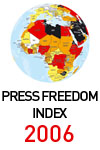
Source:
Reporters Without
Borders 2006
(lower score is better)
The U.S.A. landed in 53rd position. Denmark dropped to 19th place because of the threats against the authors of the "Mohammad cartoons".
The questionnaire was sent to partner organisations of Reporters Without Borders (14 freedom of expression groups in five continents) and its 130 correspondents around the world, as well as to journalists, researchers, jurists and human rights activists. A scale devised by the organisation was then used to give a country-score to each questionnaire. The Statistics Institute of the University of Paris provided assistance and advice in processing the data reliably and thoroughly.
During this time, how many
journalists:
1. Were murdered?
2. Were murdered, with the state involved?
3. Were arrested or sent to prison (for however long)?
4. Are currently in jail and serving a heavy sentence (more than a year) for
a media-related offence?
5. Were threatened?
6. Were physically attacked or injured?
7. Fled the country?
Were any journalists (yes/no):
8. Illegally imprisoned (no arrest warrant, in violation of maximum period of
detention without trial or court appearance)?
9. Tortured or ill-treated?
10. Kidnapped or taken hostage?
11. Did any journalists disappear?
Over the period, was/were there (yes/no):
12. Armed militias or secret organisations targeting journalists?
13. Terrorist action against journalists or media firms?
14. Improper use of fines, summonses or legal action against journalists or
media outlets?
15. Routine failure to prosecute those responsible for seriously violating press
freedom?
16. Prison terms imposed for media-related offences defined by law?
17. Attacks or threats against family, friends or colleagues of journalists?
18. Surveillance of journalists (phone-tapping, being followed etc)?
19. Problems of access to public or official information (refusal by officials,
selection of information provided according to the media’s editorial line
etc)?
20. Restricted physical or reporting access to any regions of the country (official
ban, strict official control etc)?
21. Media outlets censored, seized or ransacked? (how many?)
22. Searches of media premises or homes of journalists?
23. Surveillance of foreign journalists working in the country?
24. Foreign journalists deported?
25. Problems getting journalist visas (undue delay, demand to know names of
people to be interviewed etc)?
26. Censorship or seizure of foreign newspapers?
27. Jamming of foreign broadcasts or regulating who can have satellite dishes?
28. Independent or opposition news media?
29. An official prior censorship body systematically checking all media content?
30. Routine self-censorship in the privately-owned media?
31. Subjects that are taboo (the armed forces, government corruption, religion,
the opposition, demands of separatists, human rights etc)?
32. A state monopoly of TV?
33. A state monopoly of radio?
34. A state monopoly of printing or distribution facilities?
35. Government control of state-owned media’s editorial line?
36. Improper sackings of journalists in the state-owned media?
37. Journalists forced to stop working through harassment or threats?
38. Opposition access to state-owned media?
39. Strictly-controlled access to journalistic profession (compulsory certificate
or training, membership of journalists’ institute etc.)?
40. Use of withdrawal of advertising (government stops buying space in some
papers or pressures private firms to boycott media outlets)?
41. Undue restriction of foreign investment in the media?
42. Licence needed to start up a newspaper or magazine?
43. Cases of violating privacy of journalistic sources?
44. Serious threats to news diversity, including narrow ownership of media outlets?
45. A state monopoly of Internet service providers (ISPs)?
46. ISPs forced to filter access to websites?
47. Websites shut down over the period?
48. ISPs legally responsible for the content of websites they host?
49. Cyber-dissidents or bloggers imprisoned (how many?)
50. Cyber-dissidents or bloggers harassed or physically attacked (how many?)
[ Back to Thórisson's home page ]